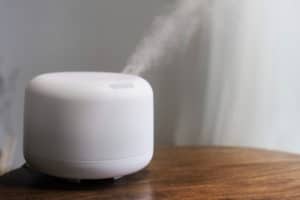Many overlook the importance of the air we breathe while we are snoozing in bed. Poor indoor air quality and environment are often the cause for people not feeling rested in the morning.
This is because these unhealthy conditions can lead to many different health issues, such as headaches or trouble sleeping at night – which then causes you to feel less than refreshed during your day!
Air temperature, humidity, and CO2 levels all impact whether you have a good night’s rest or not.
Do you ever feel like the temperature of your room feels a little different than the rest of the house?
Or maybe you can’t seem to keep your room at a comfortable temperature, no matter how often you adjust the thermostat.
If this is an issue for you, then it could be because of air quality!
What is considered good air quality?
So what makes up good air quality? It turns out that each person has different preferences for these conditions depending on their health and comfort needs.
Generally speaking, though, bedrooms should have around 50% humidity with temperatures between 65-75 degrees Fahrenheit (18-23 Celsius).
The temperature of the bedroom will not only affect your sleeping habits but also affect your overall health.
If you are cold, consider using warmer blankets or increasing the temperature by just a few degrees to get back to the optimal range.
Different Factors To Consider
There are several different factors to keep in mind when trying to achieve the best air quality in your bedroom: temperature, humidity, airborne pollutants, and air CO2 levels.
Temperature
Keeping your room at a comfortable temperature plays an important role in sleep quality. The optimal temperature varies from person to person, but a good guide would be between 65-75 degrees Fahrenheit.
This is because our body temperature decreases as we fall asleep. If you’re too hot, it will make it harder to fall asleep, and if you’re too cold, your muscles might start shivering while you try to sleep.
The AASM encourages people to sleep with an open window during the summer if they are too warm at night. An open window ensures that you get enough air while maintaining the ideal temperature.
However, make sure to get an insect window net to keep the pesky bugs out of your sanctuary. With that in mind, here are some ways to regulate your temperature during sleep.
1. Use cooling bedsheet & gel pillows
Cooling bedsheets are made using materials such as cotton and bamboo. These materials help sleepers stay cool and comfortable during the night without using air conditioning or turning on fans.
Bamboo sheets and pillowcases are good at wicking sweat away from the body, great for hot weather. Bamboo fiber also has natural anti-bacterial properties, which can help prevent odor and provide protection against dust mites.
If you don’t like these materials because of their feelings, consider using a cooling mattress topper. These toppers also help regulate your sleeping temperature.
Gel pillows are specially designed memory foam pillows filled with gel beads or water to retain coolness better than other types of pillows. You can even put them in the fridge for a short while to achieve maximum cooling levels.
2. Lightweight clothing
Lightweight clothes will allow you to remain cooler than you would if you were wearing thick clothing. This is because it reduces the amount of insulation that naturally occurs in your clothing, allowing heat to escape from your body more easily.
3. Sleep naked
Many people find it easier to sleep when they’re naked since nothing restricts their movement while they’re sleeping, but this may not be an option for some depending on where they live or who shares a room with them. If you are okay with sleeping nude, then it can help regulate your temperature throughout the night.
4. Using fans to circulate the air
Fans are an excellent way to make the room cooler. They circulate the air in your bedroom and help you feel more comfortable while sleeping by lowering your body temperature.
5. Using an air conditioner
Many people recommend using AC in the summer to regulate the desired temperature in a room. However, low humidity can make your skin dry because it has difficulty absorbing moisture from the air. One way to combat this is by using a humidifier to add moisture into the air and help your skin stay hydrated.
6. Use blanket with appropriate weight
It is important to choose a blanket that has an appropriate weight for the season. In summer, opt for a lower weight (GSM) blanket that is thinner and does not get as hot.
On the other hand, in winter, a higher weight (GSM) blanket will work better, as it will keep you warm and toasty while you sleep. There are all-season blankets available with a GSM between 250 and 600, which provide excellent insulation at any time of year.

Humidity
Humidity is important for two major reasons: it keeps your skin moisturized and keeps your nose and throat moist. If you wake up feeling extremely dry and thirsty, it may be due to low humidity. A dry environment will cause the nasal passages to be dried out, which can result in irritation.
On the other hand, high humidity can lead to mold, mildew, and other nasties for an extended period. Mold can lead to several health risks, which may be very serious depending on the type of mold.
These nasty molds spread very quickly if not taken care of in the early stages. Having mold growth in the bedroom will cause the air quality to decline drastically. This is especially dangerous for those with allergies and asthma.
The air humidity in your room can also affect how warm or cold it feels. The higher the humidity, the warmer it will feel because water vapor is a poor conductor of heat.
Conversely, a dry environment will cause you to feel cooler because there is no humidity to trap the warmth from your body.
Humidity levels should be around 50-60% for optimal conditions. There are a few different methods to find out the humidity of your room.
You can check the humidity using a hygrometer that can be bought for $10 at any hardware store, or using an electric dehumidifier, as some have a humidity sensor built-in to them.
If you are trying to reduce the humidity, but electric dehumidifiers are too expensive, you can consider using a charcoal dehumidifier. They are inexpensive and easy to use!
To increase the humidity, consider using a humidifier. It will moisten the air around you so that you can breathe easier. Be sure to clean it regularly, so mold doesn’t form.

Air Pollutants
There are two different types of air pollutants that affect our sleep – Outdoor pollutants and indoor pollutants.
Outdoor pollutants are outside your home and are usually beyond your control, such as living near a busy road, air pollution, etc.
Inversely, indoor pollutants are from inside your home. These can be from smoke from a fireplace, cigarette smoke from a smoker in your household, cooking fumes from the kitchen, etc.
Indoor pollutants are within your control and can usually be reduced or eliminated.
There are several ways to keep indoor pollutants at bay:
- Use an air purifier to get rid of dust and other particles that may trigger allergies
- Keep your room well-ventilated by opening windows
- Shut windows when you leave the house
Air pollution is a tough issue to get rid of. If you live in a region where the air pollution index is high, it seems almost impossible to avoid breathing the air surrounding us.
Using an air purifier can help you improve the air quality in your home or bedroom. There are many different options available, including those that use ultraviolet light to kill bacteria and those that work by filtering the air as it passes through.
You can also keep your room well-ventilated by opening windows when you get home.
Don’t forget to shut the windows before leaving your house to prevent pollutants from getting in through open windows.

CO2 level
Did you know if you sleep with your windows and door closed with no ventilation, the CO2 level can go up to a dangerous level of 2,500-5000 ppm? Which is 5 to 10 times the safe CO2 range.
Without fresh air ventilation at night, carbon dioxide can affect our general cognitive ability. Although that sounds serious, it is very unlikely to be severe unless you are living in a metal square box.
Even when you keep your windows and doors closed, there are small gaps and holes in the windows and doors, allowing air to flow through.
As long as you keep your windows and doors open a little, it will be sufficient to prevent such levels of CO2 from accumulating in your bedroom at night.
The other way is to have air ventilation installed in your bedroom. This can be through a ventilation hole in the wall or air conditioners with an exhaust fan.
Conclusion
Your bedroom air quality is just as important to the health of your sleep cycle as what you eat or drink before bed.
The level of CO2 can rise dangerously high if there are no ventilation holes, which means it’s crucial for people who live in an apartment building to keep their windows open at night.
If you’re someone who doesn’t like sleeping with a window open, consider getting an exhaust fan installed on your AC unit so that fresh air will circulate through the room while you sleep.
For those living outside major metropolitan areas where pollution levels may be higher, an air purifier should help filter out any particulates present and improve indoor air quality during everyday use.
We hope this article has helped shed some light on how certain factors affect your sleep quality!
Frequently Asked Questions
1. How can I determine if my room has good air quality?
The best indicator of your room’s air quality is if you feel comfortable when in the room. Slight signs of discomfort such as an itchy throat, dry skin, or a runny nose may indicate poor air quality.
If these symptoms are persistent over time, you should consider taking steps to improve your indoor air quality with an air purifier or humidifier. An easy way to measure indoor humidity levels is by using a hygrometer.
2. What can be done to improve my bedroom’s air quality?
There are many different ways for improving your bedroom’s air quality; a quick recap of what we covered in this article is:
- Opening windows during the day (preferably with fly screens)
- Use an air purifier for removing dust and pollutants
- Having an air humidifier to add moisture into the air during dry months
- Using blankets appropriate for the season
3. What can I do if my apartment has poor indoor air quality?
If there are many common areas in your apartment building that have issues with poor indoor air quality, there are still things you can do!
For example, keeping windows closed during the day and opening them at night can help circulate fresh air into your home. Alternatively, using an air purifier or humidifier can improve the air quality in your house.
If you can’t choose another place to live, always ask your landlord for help if there are issues with indoor air quality in your house.
Showing them this article is a good way to convince them that it should be concerned about!
4. What can I do about the air quality outside my bedroom?
Outdoor pollution also affects our ability to get good rest at night. Although we generally spend most of our time inside, it is still important to think about what we’re breathing in when we’re out and about
Using an N99 mask when commuting or exercising outdoors can help filter out harmful pollutants such as exhaust fumes smog (which cities like Beijing are all too familiar with.
It won’t fix the problem completely, but it’s still a step in the right direction!











